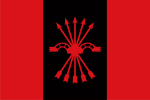
The Falange Española de las Juntas de Ofensiva Nacional Sindicalista was a fascist political party founded in 1934 as merger of the Falange Española and the Juntas de Ofensiva Nacional-Sindicalista. The Falange Española de las JONS ceased to exist as such when, during the Civil War, General Francisco Franco merged it with the Traditionalist Communion in April 1937 to form the similarly named Falange Española Tradicionalista y de las JONS, which became the sole legal party in Spain until its dissolution in 1977.
Corporate nationalism is a phrase that is used to convey various meanings:

The Communist Party USA, officially the Communist Party of the United States of America (CPUSA), is a communist party in the United States established in 1919 after a split in the Socialist Party of America following the Russian Revolution.
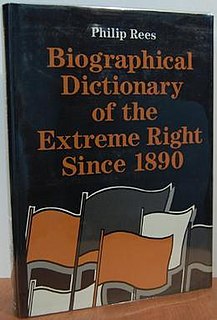
The Biographical Dictionary of the Extreme Right Since 1890 is a reference book by Philip Rees, on leading people in the various far right movements since 1890. It contains entries for what the author regards as "the 500 major figures on the radical right, extreme right, and revolutionary right from 1890 to the present" . It was published, as a 418-page hardcover, in New York by Simon & Schuster in 1990 (ISBN 0-13-089301-3).
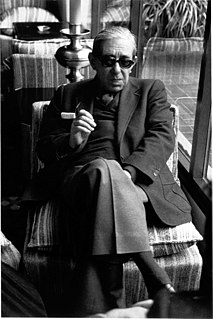
Gonzalo Torrente Ballester was a Spanish writer associated with the Generation of '36 movement.

Cara al Sol is the anthem of the Falange Española de las JONS. The lyrics were written in December 1935 and are usually credited to the leader of the Falange, José Antonio Primo de Rivera. The music was composed by Juan Tellería and Juan R. Buendia.

La Violencia was a ten-year civil war in Colombia from 1948 to 1958, between the Colombian Conservative Party and the Colombian Liberal Party, fought mainly in the countryside.

The Democratic Party is one of the two major contemporary political parties in the United States, along with the Republican Party. Tracing its heritage back to Thomas Jefferson and James Madison's Democratic-Republican Party, the modern-day Democratic Party was founded around 1828 by supporters of Andrew Jackson, making it the world's oldest active political party.
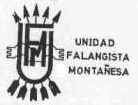
Unidad Falangista Montañesa was a Falangist political party in Cantabria, Spain. It was formed by the Provincial Junta for Promotion of Falangist Unity, a group that had broken away from FE de las JONS on July 1, 1978. UFM was registered as a political party on March 24, 1980. The founding president of UFM was Ramón Garcia-Salmones Salas.

The Falange Española Tradicionalista y de las Juntas de Ofensiva Nacional Sindicalista was the sole legal party of the Franco regime in Spain. It emerged in 1937 from the merger of the Carlist Party with the Falange Española de las JONS and was dissolved in 1977 by Adolfo Suárez's transitional government.
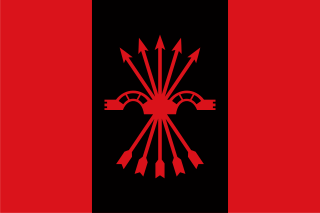
Falangism in Latin America has been a feature of political life since the 1930s as movements looked to the national syndicalist clerical fascism of the Spanish state and sought to apply it to other Spanish-speaking countries. From the mid 1930s, the Falange Exterior, effectively an overseas version of the Spanish Falange, was active throughout Latin America in order to drum up support among Hispanic communities. However, the ideas would soon permeate into indigenous political groups. The term "Falangism" should not be applied to the military dictatorships of such figures as Alfredo Stroessner, Augusto Pinochet and Rafael Trujillo because while these individuals often enjoyed close relations to Francisco Franco's Spain, their military nature and frequent lack of commitment to national syndicalism and the corporate state mean that they should not be classed as Falangist. The phenomenon can be seen in a number of movements both past and present.

Fascism in North America is composed of a set of related political movements in Canada, the United States, Mexico and elsewhere that were variants of fascism. Fascist movements in North America never realized power, unlike their counterparts in Europe. Although the geopolitical definition of North America varies, for the sake of convenience it can be assumed to include Central America and the Caribbean, where fascist variants also flourished.

Dionisio Ridruejo Jiménez was a Spanish poet and political figure associated with the Generation of '36 movement and a member of the Falange political party. He was co-author of the words to the Falangist anthem Cara al Sol. In later years he fell from favour with the Francoist State and eventually became associated with opposition groups.
The 2011 Bolivian special municipal elections were held on 18 December 2011. These elections cover three of five municipalities currently without elected mayors in Bolivia: Sucre, Quillacollo, and Pazña. Elections for the Mayor of Punata will be held 29 April or 6 May 2012. Newly elected mayors will receive their credentials from the Supreme Electoral Tribunal on 27 January 2011, after which they may be sworn in.

Falange Española de las JONS is a Spanish political party registered in 1976, originating from a faction the previous Falange Española Tradicionalista y de las Juntas de Ofensiva Nacional Sindicalista. The word Falange is Spanish for phalanx. Members of the party are called Falangists. The main ideological bases of the party are national syndicalism, third positionism and ultranationalism.

Falange Española Independiente was a Spanish political party registered in 1977, originating from the Frente de Estudiantes Sindicalistas (FES), a student group of anti-Francoist falangists.

Movimiento Falangista de España is a Spanish political party registered in 1979. The party considers itself heir of classic Falangism, openly rejecting Francoism, originating from a split of the Círculos Doctrinarios José Antonio, led by Antonio Jareño. Currently the party only has activity in Cantabria.

The Unification Decree was a political measure adopted by Francisco Franco in his capacity of Head of State of Nationalist Spain on April 19, 1937. The decree merged two existing political groupings, the Falangists and the Carlists, into a new party - the Falange Española Tradicionalista y de las Juntas de Ofensiva Nacional Sindicalista. As all other parties were declared dissolved at the same time, the FET became the only legal party in Nationalist Spain. It was defined in the decree as a link between state and society and was intended to form the basis for an eventual totalitarian regime. The head of state – Franco himself – was proclaimed party leader, to be assisted by the Junta Política and Consejo Nacional. A set of decrees which followed shortly after appointed members to the new executive.


